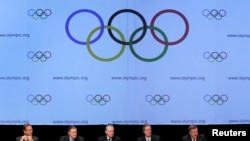The United States Olympic Committee (USOC) has rejected a call to boycott the Sochi Winter Olympics if Russia grants asylum to Edward Snowden, saying it was not in the best interests of the country or the athletes.
USOC spokesman Patrick Sandusky released a statement on Wednesday outlining the committee's opposition to any political boycott of the Games.
"If there are any lessons to be learned from the American boycott of 1980, it is that Olympic boycotts do not work," the statement read.
"Our boycott of the 1980 Olympic Games did not contribute to a successful resolution of the underlying conflict. It did, however, deprive hundreds of American athletes, all whom had completely dedicated themselves to representing our nation at the Olympic Games, of the opportunity of a lifetime.
"It also deprived millions of Americans of the opportunity to take pride in the achievements of our athletes, and in their dedication and commitment, at a time when we needed it most."
The U.S. boycotted the 1980 Summer Olympics in Moscow in protest at the Soviet Union's invasion of Afghanistan. The Soviet Union responded by leading a boycott by Eastern bloc countries of the 1984 Olympics in Los Angeles.
Earlier this week, U.S. Senator Lindsey Graham said the United States should consider boycotting the 2014 Sochi Winter Olympics if Snowden, a former U.S. spy agency contractor accused of leaking classified information, was granted asylum in Russia.
"I love the Olympics, but I hate what the Russian government is doing throughout the world," Graham told NBC on Tuesday. ''If they give asylum to a person who I believe has committed treason against the United States, that's taking it to a new level."
The prospects of a boycott appeared slim with the final decision to skip the Feb. 7-23 Sochi Games up to the USOC.
"While we acknowledge the seriousness of the issues at hand, we strongly oppose the notion that a boycott of the Olympic and Paralympic Games is in our country's best interests," Sandusky said.
USOC spokesman Patrick Sandusky released a statement on Wednesday outlining the committee's opposition to any political boycott of the Games.
"If there are any lessons to be learned from the American boycott of 1980, it is that Olympic boycotts do not work," the statement read.
"Our boycott of the 1980 Olympic Games did not contribute to a successful resolution of the underlying conflict. It did, however, deprive hundreds of American athletes, all whom had completely dedicated themselves to representing our nation at the Olympic Games, of the opportunity of a lifetime.
"It also deprived millions of Americans of the opportunity to take pride in the achievements of our athletes, and in their dedication and commitment, at a time when we needed it most."
The U.S. boycotted the 1980 Summer Olympics in Moscow in protest at the Soviet Union's invasion of Afghanistan. The Soviet Union responded by leading a boycott by Eastern bloc countries of the 1984 Olympics in Los Angeles.
Earlier this week, U.S. Senator Lindsey Graham said the United States should consider boycotting the 2014 Sochi Winter Olympics if Snowden, a former U.S. spy agency contractor accused of leaking classified information, was granted asylum in Russia.
"I love the Olympics, but I hate what the Russian government is doing throughout the world," Graham told NBC on Tuesday. ''If they give asylum to a person who I believe has committed treason against the United States, that's taking it to a new level."
The prospects of a boycott appeared slim with the final decision to skip the Feb. 7-23 Sochi Games up to the USOC.
"While we acknowledge the seriousness of the issues at hand, we strongly oppose the notion that a boycott of the Olympic and Paralympic Games is in our country's best interests," Sandusky said.





